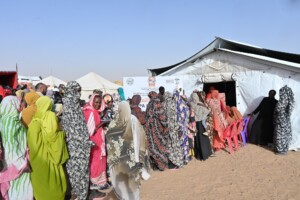‘Sudan sliding towards the abyss’: analyst
The country is disintegrating, says a Sudanese political and legal affairs analyst.
According to analyst Ahmed Hussein Adam, “Sudan could become even worse than Somalia”.
He told Radio Dabanga on Friday that “It is imperative that the Sudanese opposition overcome their differences and unite, in order to avoid the dangerous slide currently facing Sudan”.
The country is disintegrating, says a Sudanese political and legal affairs analyst.
According to analyst Ahmed Hussein Adam, “Sudan could become even worse than Somalia”.
He told Radio Dabanga on Friday that “It is imperative that the Sudanese opposition overcome their differences and unite, in order to avoid the dangerous slide currently facing Sudan”.
The opposition has a responsibility towards all the Sudanese, “which now requires a unified entity that will lead the country in this perilous time, and work for regime-change and the rebuilding of Sudan on democratic principles,” he said.
“After the recent austerity measures, the Sudanese have broken the barrier of fear. There are courageous moves to isolate and face the regime that is in a state of disintegration.”
Subsidy cuts
As the ongoing shortages of hard currency at the Central Bank of Sudan continued to push the black market rate of the US Dollar upwards this year, Khartoum decided on an economic reform programme, which according to President Omar Al Bashir was needed “to avoid the collapse of the country”.
The Minister of Finance announced the liberalisation of fuel and electricity prices on 3 November. Two weeks later, while the domestic transportation tariffs were soaring, the government also liberalised the official hard currency rates for a number of import goods and services.
After the Central Bank of Sudan cancelled the subsidised US Dollar rate of SDG7,5 for the import of medicines, the new Dollar rate rose to SDG17,50. Medicines prices doubled and in some cases even tripled. At the same time, the Civil Aviation Corporation officially requested airlines flying on Sudan to adopt the Sudanese Pound rate of 15.90 for one US Dollar. The former official Dollar rate was set at SDG6. The prices of airline tickets immediately rose by more than 150 per cent.
The hard currency rate on the black market in Sudan began to rise rapidly in 2010. In September that year, the Central Bank of Sudan announced that the lack of hard currency was becoming acute. The secession of South Sudan in July 2011, with which Sudan lost two-thirds of its oil revenues, an important source of hard currency, exacerbated the crisis.











 and then
and then